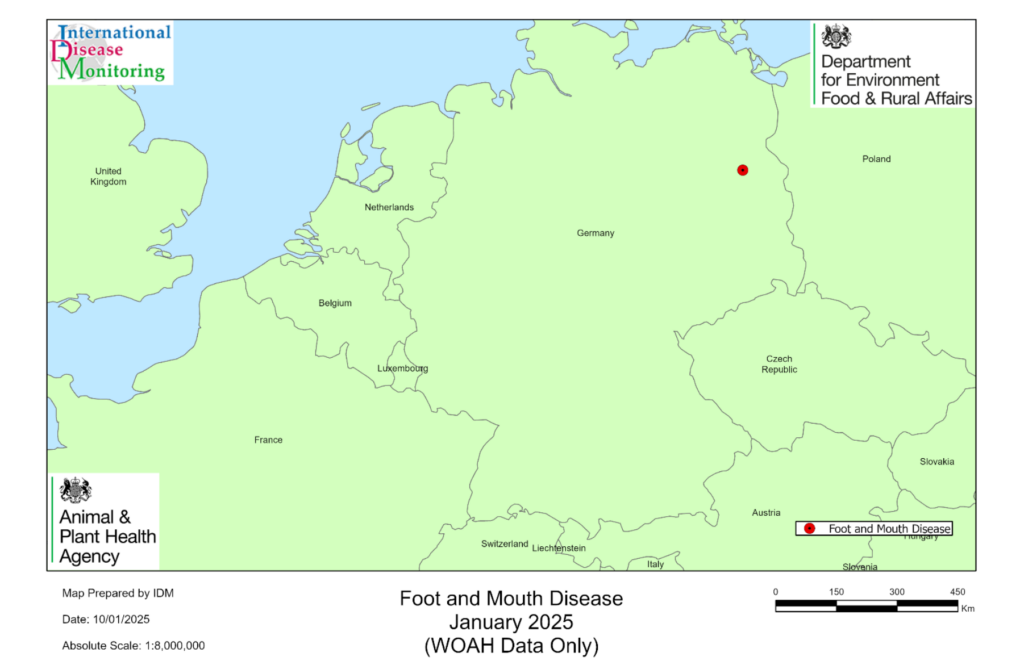The Animal and Plant Health Agency (APHA) has raised the risk level for the incursion of foot-and-mouth disease into the UK to ‘medium’, following the discovery of the virus in water buffalo in Germany.
“The detection of FMD virus serotype-O in Europe, where there is no vaccination coverage, is of great concern,” APHA said in its preliminary assessment of the outbreak.
“The events highlight how this virus can make significant and unexpected jumps, often through trade and movements of people, animals and animal products, and there is a need for continued vigilance.”
The agency said it was currently unclear how the disease reached Germany, how many premises have been affected or, crucially, whether virus has infected local wildlife such as wild boar or deer.
“On the basis of the multiple pathways for FMDV to spread, we therefore consider there to be an increase in the risk of incursion of FMD to the UK and risk level has therefore increased to medium during this period of uncertainty.”
Import ban
On January 14, the UK government confirmed a ban on the import of cattle, pigs and sheep and their products from Germany. GB health certificates will no longer be issued for animals susceptible to FMD, including all live animals and fresh meat and animal products in order to protect farmers and their livelihoods, the department said.
APHA noted that there have been no imports of live susceptible animals from Germany in two incubation periods since 12 December. It added that illegal trade in live animals of susceptible species from any affected areas to Great Britain is ‘less likely due to the logistics, but it cannot entirely be ruled out’.
Germinal products, products of animal origin (POAO) and animal by-products (ABP) from susceptible species from Germany are considered a risk for FMD transmission, and any consignments imported from Germany since December 12 are being traced. Further consignments are restricted unless POAO and ABP have been processed with a treatment that sufficiently mitigates FMDV.
APHA highlighted the change to the regulations designed to protect the UK from ASF in September meaning personal imports of pork or pork products legally must be under 2kg and commercially packaged and stamped.
“Illegal trade of POAO is difficult to quantify but given the proximity to Germany and close connections with large movements of workers, tourists and at present, refugees, vigilance along all the neighbouring countries should be heightened at present,” APHA said.
“Vehicles, farming equipment and people represent a risk of fomite transmission from regions with high levels of infection, possibly on vehicles or people who have visited livestock in the region. Therefore, maintaining biosecurity for returning vehicles, equipment, and workers visiting livestock premises is paramount.”
Given that the FMD outbreak in Germany is well over 800km away, there is considered to be no risk to the UK from airborne transmission.
Control measures
The three cases of FMD confirmed in a small herd of 14 water buffalo in Märkisch-Oderland, Brandenburg represented the first reports of FMD in Germany since 1988, and the first cases in the EU since an outbreak in Romania in 2011.
The German National Reference Laboratory for FMD, the Friedrich-Loeffler-Institut (FLI), has characterised the virus as serotype O, but the exact origin and incursion route is currently unknown.
The local authorities have imposed control and protection measures, including restrictions on susceptible animal movements in Brandenburg and Berlin, a 1km cull around the infected premises, including around 200 pigs at a nearby farm, suspending export health certificates and the closure of zoos, while further tests are being carried out at the FLI.
Suitable vaccines against FMD are available in the German FMD antigen bank. When needed, the FMD antigen bank can produce the necessary vaccines within a few days. While the production of the appropriate vaccine is ongoing, the German NRL the FLI has stated that all cloven-hoofed animals in the vicinity of the affected farm will be tested to determine the actual spread of the outbreak and inform any further control measures, as well as vaccine response.
While there is currently no evidence of further spread to other animals, epidemiological analysis is ongoing. “As the situation is emerging, there is additional uncertainty regarding how far disease has spread before detection,” APHA said.
Other EU countries
Neighbouring and other European countries are on high alert for the disease. The Netherlands implementing a national ban on the movement of veal calves and a ban on visitors to veal farms, after more than 3,600 calves were transported from Brandenburg to the Netherlands since 1 December, via collection centres elsewhere in Germany.
The ban prompted the suspension of export health certificates for non-EU desinations, including the UK. But Germany’s agriculture ministry said on Wednesday it expects meat and dairy product exports to the EU to continue, Reuters reports.
The ministry said the European Commission had decided Germany’s action to impose 10km quarantine zones of around the infected farm is sufficient to permit the use of the ‘regionalisation’ trade principle, meaning imports of meat and dairy products are only restricted from the region where the disease has been confirmed and not from the whole of the affected country.
German agriculture minister Cem Oezdemir said: “After the news last week, the decision from Brussels is a ray of light for farmers.”
It remains to be seen whether the UK will go down this route at a later stage.
Other countries have placed imports bans on Germany, including Mexico and South Korea, which will conduct FMD virus tests on German pork products shipped to the nation since December 27.




